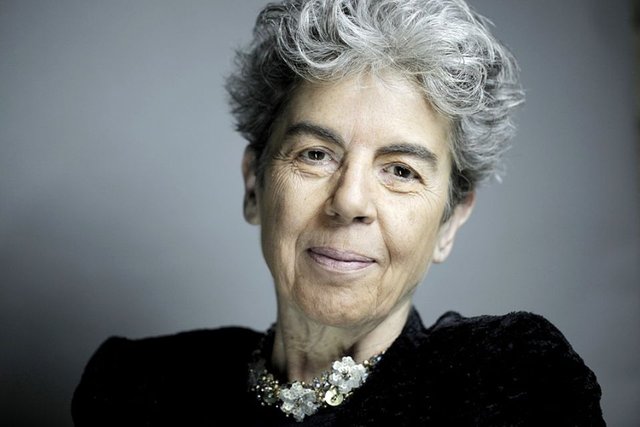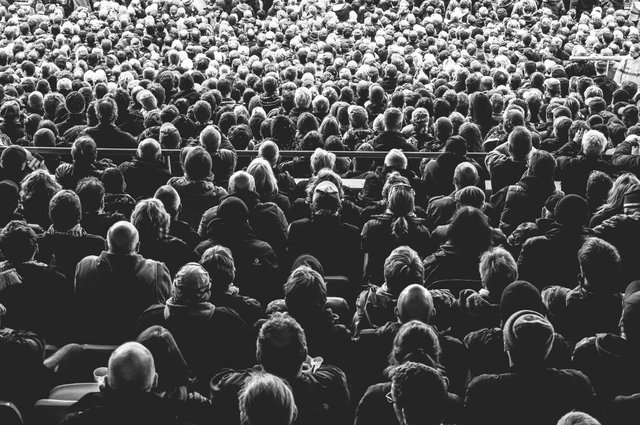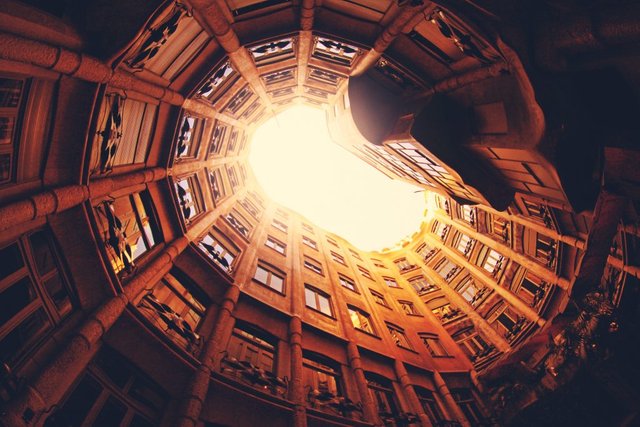A French philosopher, a journalist and novelist, Chantal Delsol, has identified himself as a representative of liberal conservatism. The thinker in charge of totalitarianism, individualism, authority, populism and freedom does not shy away from sharply addressing the topical issues of politics and religion - not an exception, and this philosophy's conversation with Algirdas Acumi. Interview on the great ideologies of the 20th century, the fate of Europe as a project, populism in politics, religious threats and threats to religion.

photo author Olivier Roller
Algirdas Acus: Recently, you are paying much attention to ideologies, but what is the difference between ideology and religion?
Chantal Delsol: I think there is a fundamental, even radical difference, between ideology and religion. Religion is the answer to the question that all people ask themselves from the very beginning of Kromanion: why should I die? The answers to this question vary according to culture. So religion is a culturally responsible answer to this universal question. But this does not mean that the answers of religion are systematic. Meanwhile, ideology is a set of systematic and absolute responses, covering everything and preventing escape.
It is true that religion, all religions, can become systematic and degenerate into an ideology. For example, Catholicism became an ideology in the times of the Inquisition. Today, one Islamic branch - Salafism - has become an ideology. I think that all religions can become ideologically degenerating. But it is also true that today we are inclined to think of Catholicism as degenerate. When it comes to Catholicism, only inquisition or Crusades is mentioned. So it's ludicrous to say that since all religions are corrupt, it would be better if they disappeared. My head is almost the opposite. Christianity, here I am speaking in general about Christianity, not only about Catholicism, is a religion of doubt. This is a non-guaranteed religion. For this reason, this religion can maintain a culture in which we support democracy - an uncertainty policy. There is no uncertainty in ideology. No doubt It's a rigorous, complete and absolute system.
In the last century, we knew of at least two terrible ideologies. You mentioned Communism and Nazism. You often argue that in the 20th century Experience has shaken Europe, it has turned out to be a kind of inferiority complex, so now it is afraid to take something substantially positive. How did all this affect religion? How did a person deal with the great ideologies of the question of faith and is he now deciding the same way? Or maybe you totally refuse such a question?
The two great totalitarian ideologies that we have known and still know, somewhere in which communism still exists, derives directly from the failure of transcendental religion. Transcendental religions are monotheistic, they were true religions, seeking to know the principle of truth. The truth is free from myths. The god of monotheism is the child's idols, casting out paganism. When modernity came and monotheistic religions were destroyed, there was a huge emptiness: there is no longer myth or truth. In other words, it seeks to restore a truth that is no longer transcendent. What happens when ideologies come about to change religious religions? We could say, as they said in May 68: "God died. Marx died And I myself feel myself. "
So what's going on today? We are going to destroy the regime of reality, in which we lived in the shadow of Christian monotheism and ideologies. Destroying the truth mode and returning to the myths that are another mode of thinking. We adapted religions that are pagan. For example, the fact that killing unborn children - abortions - or the fact that killing a disabled child is all pagan. In addition, we return to certain forms of ancient and distant mythology. These are different answers to the question of anxiety, about the great end.

photo author Davide Ragusa
How do you think that after a painful ideological experience, the person has become more resistant? Do you sleep calmly in the 21st century, or do you still fear that even more terrible ideologies can emerge?
I totally do not think that we now have immunity to them. We always look short-sighted. We have in the head the image of Nazism, which we do not allow to repeat. However, we do not see the development of other tyranny, which are perhaps as terrible as Nazism or even worse. Evil does not have degrees. We do not see how he comes in. Salafism is just as dangerous as Nazism, but we are burdened with the indignation of the poor Muslims who are victims of history and of our colonization, who were shot during the protests until recently, in the 1960s ... We can not imagine that these are very dangerous people. This is worrying. It's serious.
You have already mentioned the difference between Nazism in the West and communism in the East. In fact, these regions have experienced different forms of totalitarianism. What do you think this has to do with modern politics? It seems that we do not really understand each other. In the East, it looks as if it is less fondly viewed as fascism, and in the West, as you have said, communism. What does this mean in terms of current policies, in particular the European Union?
There is a huge difference between these totalitarian ideologies. I think that we will not break into thinking (though it can be argued) that the intentions of communism were good, even if it was crazy idealistic, and that the intentions of Nazism were cynical. Although there is a big difference between them, the results are the same. On both sides - terror and horror, which we can not measure.
But there is another very important difference. I noticed it when I was attending a conference in eastern Poland, which was designed to compare both variants of totalitarianism. The aim was to show that they are equally horrible. In the evening, after the announcement, a party took place where the Russians played the guitar and sang the Soviet-era song that the Communists sang in Poland, in which it says, "We will crush you, we will walk on your graves, we will crumple on your graves," and so on.
All the Poles in the hall started singing with great enthusiasm. Lipo was crying on the table ... Then I asked, "Can you sing the same Nazi song?" They replied: "It would be terrible, Nazi songs would never be." I saw the former Germans seeing their heads at the dishes. Communist songs are as horrific as the Nazis. Then I said, "Come on, we're in a conference where we compare each other. Why? "
I answered what I still do not understand: "You know, Nazism in Germany lasted ten years. You can make a decade of your life. Meanwhile, communism lasted for all of us. During the communist times we were young, we fell in love, we created families, we waited for children, we nursed our parents. You can not dig it. "Therefore, I think that communism can not be treated in the same way as Nazism.
How did the great totalitarianism affect other parts of the world? Of course, North Korea or China has remained Communist so far, but have countries that have freed themselves from Communism, like them, or have replaced their totalitarianism, have amortized themselves?
I think that communism, in these far-flung countries, the Far East, North Korea, China, Laos and even Vietnam, was a continuation of the usual despotism. I think that this was partly the case in Russia as well. Countries like China have been used to evict two million people from one city to another in order to show power. People were accustomed to despotism. It is also hard to deny that faith in those countries - as I speak about Buddhism or other Asian religions - sees the world differently from ours. I note the process begun in Cambodia against the Khmer Rouge, which was then considered completely absurd for the population. They recognized this process in order to imagine the West, but did not understand why Pol Pot could be prosecuted. Why can Pol Poto ask for reparations? They think that karma works differently than we interpret similar phenomena.

photo author Alexandre Perotto
Recently, you are interested in populism. The impression is that a lot of religious people are also inclined to him, but he is probably nothing more than an ideology. How would you comment on contemporary populism as a phenomenon?
Populism is not a naming, because nobody says, "I am populist." Other people stick us with this label. This is a despicable saying. But what is populist? I tried to create a list of people who were kept in them and try to find out all the features that are characteristic of them. In essence, those who are considered as populists are people who are looking for a conservative "rooting" and believe that we live in an overly emancipated culture.
The emancipated culture here means that we are "citizens of the world", and not just France, that we can do very well without religion, we can be atheists and happy people. All this is said by the French elite, as well as by the elite in Germany or elsewhere. That we are not root and everything is possible implies, for example, this statement by Merkel: "Our factories need two million hands. A million Turks or Sirs hands are the same as a million German hands. Culture does not matter, it does not matter. We are not rooted in culture, etc. "People called populated people do not accept this. They say: "We are not just citizens of the world, we are first and foremost French citizens, citizens of Burgundy, Lyon or Paris. The hands of the Sir, servicing the factories, are not the same as the German hands, because the German is not the same as Sirius, etc. "I think it's populism.
Touched the Muslim question, I would like to stay there. It seems that European politicians seem to understand that Europeans are somewhat lost ground and are afraid of arriving Muslims, because, as Orban recently said, their strong personalities, they will throw out the ancient continent's inhabitants. How do you judge this fear of Islam, how much is it based on?
First of all I would like to say that a constant critique of fear conceals something hypocritical. It is said that those who are afraid are wrong and evil. However, on matters such as ecology, dialectics of fear is overcome. Hans Jonas says: "It is necessary to use fear in the face of ecological problems." Fear is a good advisor, and in other cases it's bad. Fear is not necessarily a bad feeling - that's the first thing I want to say.
Secondly, the fear of Muslims, in my opinion, is not stupid. After all, when we abandoned religions, we glorified ourselves to emptiness. We first abolished transcendental religions, replaced them with ideologies, and now there are no ideologies either. In particular, atheistic countries like France or the Czech Republic are looking for emptiness. French is a void search. In this void we can fear that we will fall into "terrorist religions," for example, salafism. It's a long way that I do not think that this threat affects the whole of Islam: it's about his traitors. Young Islamists going to Syria, or bomber producers, are those who feel the horror of emptiness.
We, people, can not do without religion. We can be afraid of Salafism, because we are afraid of emptiness. If we stop to fear emptiness, we will not stop. Therefore, I think we are right in fear. This is true of Orban. He says: "We can not, as we now are, to disregard immigrants. We can not say the same as Merkel says. "Now I have said something that is not politically correct. But I think that the Germans will soon kill themselves.
The Germans are persecuted for guilt, and therefore they do not want to defend their culture. Therefore, they say that they can receive as much of Syria as they are on this earth. It's not sensible to think so. This is a suicidal attitude. I think Orban was not entirely wrong in saying that we do not want to accept the whole world. We can not accept the whole world. Government is not about declaring values. It is primarily aimed at ensuring the continuity of the people of their country in order to protect them. Cicero is saying, "Man, you or me, may desire death." We may want to die to save our children. We may want to commit suicide, because in any case we are mortal. But society is immortal. Her vocation is to be immortal. Therefore, she does not have the right to desire death due to values. She must continue. "Therefore, I do not understand why the fear of perseverance can be understood as false.
You are nonetheless a European Union enthusiast, although there is no shortage in France in saying that the EU needs to be destroyed, that it is guilty of anything called "soft totalitarianism" that it destroys our religious experience. What is your attitude towards the influence of the community on religiousness in Europe and vice versa - what impact does the current religious situation make on the European Union?
First of all, a small note on the phrase "soft totalitarianism". I do not want to use it, because I think that people who have survived both totalitarianism have become quite upsetting, so that we do not dishonor them with everything else. With that in mind, I think there is a dull and enlightened despotism in Europe. Jacques Delors in 1979 In Strasbourg, "Europe has become silent and illuminated by despotism." I consider myself to be very European, but I think that Europe, as it was created, can not work. If it were created by the Germans, it would be federal. However, it was created by the French, so it is centralized and Jacobic. This is Europe where we are obliged to measure the flower vase when we do not have an army that we could send to the war in Bosnia or Ukraine. I think that, as it is now, Europe can not redefine itself, as it was in the hands of a certain number of non-Homeland functionaries and technocrats. Unfortunately, I suspect that Europe must fight to reborn after fifty or hundred years.
credits: Algirdas Acus
